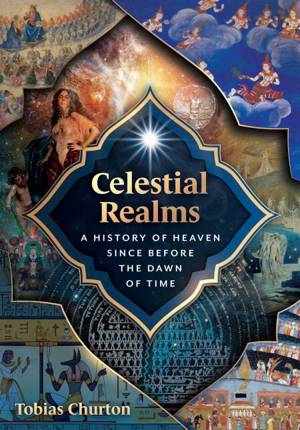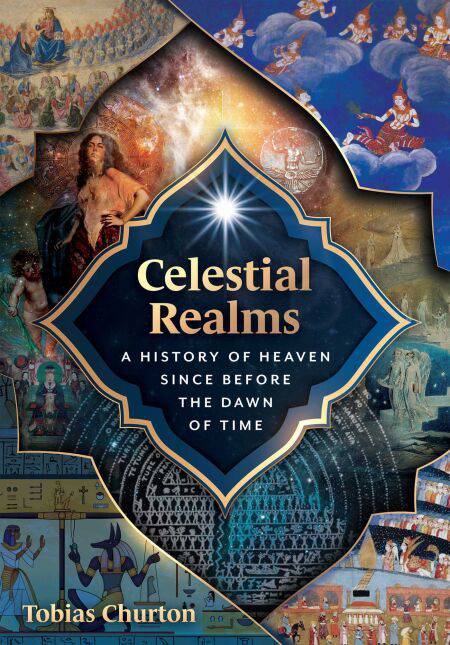
Je cadeautjes zeker op tijd in huis hebben voor de feestdagen? Kom langs in onze winkels en vind het perfecte geschenk!
- Afhalen na 1 uur in een winkel met voorraad
- Gratis thuislevering in België vanaf € 30
- Ruim aanbod met 7 miljoen producten
Je cadeautjes zeker op tijd in huis hebben voor de feestdagen? Kom langs in onze winkels en vind het perfecte geschenk!
- Afhalen na 1 uur in een winkel met voorraad
- Gratis thuislevering in België vanaf € 30
- Ruim aanbod met 7 miljoen producten
Zoeken
Celestial Realms E-BOOK
A History of Heaven since before the Dawn of Time
Tobias Churton
E-book | Engels
€ 23,48
+ 23 punten
Omschrijving
• Comprehensively explores the meanings, history, ideas, and experience of Heaven throughout the world’s exoteric and esoteric traditions
• Explores the heavens of Egypt, Mesopotamia, Greece, the Abrahamic traditions, Far Eastern mythologies, and Indigenous nations
• Considers questions about our “need” for Heaven, further informed by popular culture, folklore, and personal experience
Across all ages people have wondered about the afterlife. Is Heaven a reward for good behavior, the home of the gods, or a state of being? As Tobias Churton reveals, such questions and beliefs about the nature of Heaven go back to humanity’s earliest days. Beginning with mythology in ancient Mesopotamia, Egypt, and the Far East, we find sophisticated conceptions within early philosophy and the Abrahamic religions, many of which persist unchanged.
Churton examines the complexities of Jesus’s teaching that “the Kingdom of God is within you” and Islamic ideas about paradise. He analyzes the beliefs of Eastern mystics and Maori, Australian Aboriginal, and Polynesian traditions as well as heavenly conceptions among Indigenous cultures of the Americas. He presents Renaissance-era understandings of Heaven’s connection to the body in the alchemical spiritual medicine of Paracelsus and the mysticism of Jacob Böhme and reveals that Emmanuel Swedenborg, followed by William Blake, controversially associated Heaven with sexuality. Churton then delves into the contemporary era, exploring Heaven from perspectives of spiritualism, psychedelic experience, communist materialism, and the arts, including John Lennon’s lyrical suggestion that we imagine that there is no heaven.
Whether Heaven is considered a specific place or a deeply felt state of being, this in-depth investigation emphasizes its resonance and significance for all of humanity.
• Explores the heavens of Egypt, Mesopotamia, Greece, the Abrahamic traditions, Far Eastern mythologies, and Indigenous nations
• Considers questions about our “need” for Heaven, further informed by popular culture, folklore, and personal experience
Across all ages people have wondered about the afterlife. Is Heaven a reward for good behavior, the home of the gods, or a state of being? As Tobias Churton reveals, such questions and beliefs about the nature of Heaven go back to humanity’s earliest days. Beginning with mythology in ancient Mesopotamia, Egypt, and the Far East, we find sophisticated conceptions within early philosophy and the Abrahamic religions, many of which persist unchanged.
Churton examines the complexities of Jesus’s teaching that “the Kingdom of God is within you” and Islamic ideas about paradise. He analyzes the beliefs of Eastern mystics and Maori, Australian Aboriginal, and Polynesian traditions as well as heavenly conceptions among Indigenous cultures of the Americas. He presents Renaissance-era understandings of Heaven’s connection to the body in the alchemical spiritual medicine of Paracelsus and the mysticism of Jacob Böhme and reveals that Emmanuel Swedenborg, followed by William Blake, controversially associated Heaven with sexuality. Churton then delves into the contemporary era, exploring Heaven from perspectives of spiritualism, psychedelic experience, communist materialism, and the arts, including John Lennon’s lyrical suggestion that we imagine that there is no heaven.
Whether Heaven is considered a specific place or a deeply felt state of being, this in-depth investigation emphasizes its resonance and significance for all of humanity.
Specificaties
Betrokkenen
- Auteur(s):
- Uitgeverij:
Inhoud
- Aantal bladzijden:
- 384
- Taal:
- Engels
Eigenschappen
- Productcode (EAN):
- 9798888502129
- Verschijningsdatum:
- 6/04/2026
- Uitvoering:
- E-book
- Beveiligd met:
- Adobe DRM
- Formaat:
- ePub

Alleen bij Standaard Boekhandel
+ 23 punten op je klantenkaart van Standaard Boekhandel
Beoordelingen
We publiceren alleen reviews die voldoen aan de voorwaarden voor reviews. Bekijk onze voorwaarden voor reviews.









